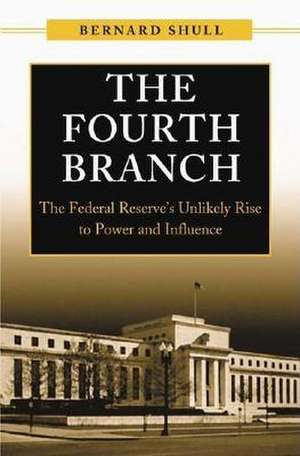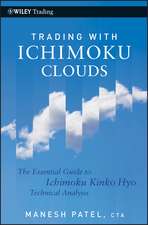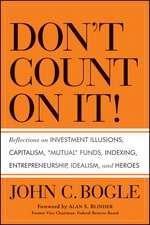The Fourth Branch: The Federal Reserve's Unlikely Rise to Power and Influence
Autor Bernard Shullen Limba Engleză Hardback – 29 iul 2005 – vârsta până la 17 ani
Preț: 438.84 lei
Preț vechi: 604.79 lei
-27% Nou
Puncte Express: 658
Preț estimativ în valută:
83.97€ • 87.90$ • 69.89£
83.97€ • 87.90$ • 69.89£
Carte tipărită la comandă
Livrare economică 31 martie-14 aprilie
Preluare comenzi: 021 569.72.76
Specificații
ISBN-13: 9781567206241
ISBN-10: 1567206247
Pagini: 272
Dimensiuni: 156 x 235 x 28 mm
Greutate: 0.58 kg
Ediția:New.
Editura: Bloomsbury Publishing
Colecția Praeger
Locul publicării:New York, United States
ISBN-10: 1567206247
Pagini: 272
Dimensiuni: 156 x 235 x 28 mm
Greutate: 0.58 kg
Ediția:New.
Editura: Bloomsbury Publishing
Colecția Praeger
Locul publicării:New York, United States
Notă biografică
Bernard Shull is Professor Emeritus in the Department of Economics, Hunter College, and a special consultant for National Economic Research Associates (NERA). He has held various positions in the Federal Reserve System, including Associate Advisor to the Board of Governors. He was also Senior Economist in the Office of the Comptroller of the Currency. He has published widely in professional and academic journals on issues of monetary, banking, and financial policy, and is the co-author of two books, Interest Rate Volatility and Bank Mergers in a Deregulated Environment (Quorum, 2001).
Cuprins
PrefaceIntroductionThe Federal Reserve's LegacyA Shock to the System: 1919-1921Collapse and Revival: 1929-1935Stagflation and the Monetary Experiment of 1979-1982The Federal Reserve's AscentFinal RemarksNotesBibliographyIndex
Recenzii
Shull provides a good overview of the history of the Federal Reserve, emphasizing its role in three economic crises: the inflation and sudden deflation of 1919-21, the Great Depression, and the stagflation period of 1973-82. In each of these events, the Federal Reserve played an undistinguished role, and was often fingered as a major cause of the problem. Despite its failures, in the wake of each crisis the Federal Reserve emerged with enhanced powers. The author credits the success of the Federal Reserve in expanding its power to its willingness to change course when conditions require it. One could just as well conclude from the evidence presented in this work that the Federal Reserve has been rewarded because it has proven itself willing and able to serve the financial community. Shull, whose career includes working for the board of governors of the Federal Reserve and the Office of the Comptroller of the Currency as well as teaching, brings both archival material and the established literature into play. His book is well written and for the most part avoids technical analysis, making it accessible to undergraduate students. Recommended. Public and academic library collections, lower-division undergraduate and up.
Dr. Shull examines how, despite convincing evidence that misguided Federal Reserve policy exacerbated a number of major economic crises, the institution has consistently emerged from each crisis more powerful and influential than before. By focusing on three critical periods of economic stress (the inflation and deflation following World War I, the stock market crash of 1929 and subsequent Depression, and the volatility of the 1970s and 1980s), Dr. Shull argues that the key to the Federal Reserve's unexpected success has been awareness of its immense value in national emergencies and its capacity to adapt to the changing economic conditions and political realities of the past century.
Dr. Shull examines how, despite convincing evidence that misguided Federal Reserve policy exacerbated a number of major economic crises, the institution has consistently emerged from each crisis more powerful and influential than before. By focusing on three critical periods of economic stress (the inflation and deflation following World War I, the stock market crash of 1929 and subsequent Depression, and the volatility of the 1970s and 1980s), Dr. Shull argues that the key to the Federal Reserve's unexpected success has been awareness of its immense value in national emergencies and its capacity to adapt to the changing economic conditions and political realities of the past century.












